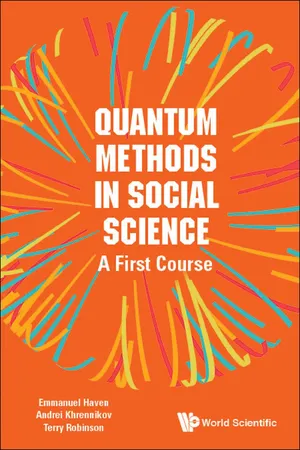
Quantum Methods in Social Science
A First Course
- 276 pages
- English
- ePUB (mobile friendly)
- Available on iOS & Android
About this book
-->
Shown here is how basic concepts of physics can be used to improve models in finance, economics, psychology and biology. Readers are introduced to how physical theory can inform non-physical phenomena in the social sciences, thereby improving decision making and modeling capabilities in research-based and professional settings.
Consisting of three parts, the first part deals with the application of quantum operator methods to financial transactions and population dynamics. Part two develops physical concepts, working from classical Lagrangian and Hamiltonian mechanics and leading to an introduction of quantum information and its application to decision making. The final part treats classical and quantum probability theory in some detail and deals, at a more advanced level, with the impact of quantum probabilities on common knowledge and common beliefs between agents in systems.
Quantum Methods in Social Science is a high level textbook for advanced undergraduate or graduate students of economics, finance and business, while also being of interest to those with a background in physics.
--> Contents:
- Quantum Counting: The Number Operator in a Social Science Context:
- Introduction
- Classical Interlude: Modelling Population Dynamics
- A Quantum Description of Systems
- Quantum Counting
- Quantum Transactions
- Quantum Migration
- More Elaborate Systems
- Conclusions
- References — Part I
- The Quantum-Like Paradigm with Simple Applications:
- Taking a Step Back
- Modeling Information with an Operational Formalism
- Decision Making and Quantum Probability
- References — Part II
- The Quantum-Like Paradigm with Advanced Applications:
- Basics of Classical Probability
- Quantum Probability
- Common Knowledge
- Quantum(-Like) Formalization of Common Knowledge
- Examples
- Appendix
- References — Part III
-->
--> Readership: Advanced undergraduate or graduate students of economics, finance and business, while also being of interest to those with a background in physics. -->
Keywords:Quantum Formalism;Physical Theory;Hamiltonian Mechanics;Probaility Theory;Financial Modeling;Langrarian Mechanics;Quantum Operator Methods;Population DynamicsReview:0
Tools to learn more effectively

Saving Books

Keyword Search

Annotating Text

Listen to it instead
Information
Operator in a Social Science Context
Chapter 1
Introduction
1.1.What’s it all about?
Table of contents
- Cover
- Halftitle
- Title
- Copyright
- Dedication
- Contents
- Preface
- About the Authors
- Part I Quantum Counting: The Number Operator in a Social Science Context
- Part II The Quantum-Like Paradigm with Simple Applications
- Part III The Quantum-Like Paradigm with Advanced Applications
- Index
Frequently asked questions
- Essential is ideal for learners and professionals who enjoy exploring a wide range of subjects. Access the Essential Library with 800,000+ trusted titles and best-sellers across business, personal growth, and the humanities. Includes unlimited reading time and Standard Read Aloud voice.
- Complete: Perfect for advanced learners and researchers needing full, unrestricted access. Unlock 1.4M+ books across hundreds of subjects, including academic and specialized titles. The Complete Plan also includes advanced features like Premium Read Aloud and Research Assistant.
Please note we cannot support devices running on iOS 13 and Android 7 or earlier. Learn more about using the app